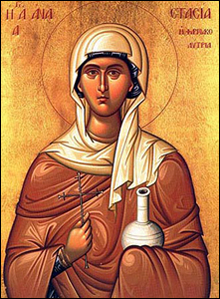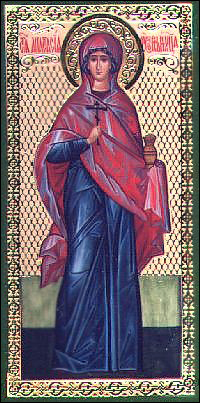On January 4th (December 22nd by the old calendar) the Church commemorates the holy great-martyr Anastasia, the deliverer from bonds.

Saint Anastasia was born in the city of Rome. She was distinguished by her nobility, meekness, and both spiritual and physical beauty. Her father was a Roman senator, a pagan; her mother was Christian. At a young age Anastasia was entrusted for education to a certain learned man names Chrysogonus, who was a Christian, well-versed in the Scriptures, and who later became a martyr. Chrysogonus not only taught Anastasia her letters, but also true faith and piety.
Upon the death of Anastasia’s mother, her father forced her into marriage with another Roman senator, also a pagan. The saint tearfully appealed to God to preserve her chastity, and the Lord helped her: Anastasia pretended to have an incurable feminine illness which prevented her from being a wife to her husband; however, when the latter still attempted to forcibly satisfy his lust, her guardian angel protected Anastasia, and her virginity remained undefiled.
Often, taking off her rich garments and secretly putting on beggar’s rags, Anastasia would leave her home and would go around to all the city prisons, bribing the guards with gold to let her enter; once inside, she visited the suffering Christians there and ministered to them with all her heart: she bathed the hands and feet of those who were incarcerated, wiped off their blood, bandaged their wounds, gave them food and drink. Afterwards, having fully taken care of them, she would return to her house.
However, Anastasia’s husband soon learned of her visits to the imprisoned Christians and became even more incensed with her. After cruelly beating her, he imprisoned her in a separate room and placed guards outside the door to make sure she could not go out. This was what grieved Anastasia most: that she could no longer visit the prisoners and take care of them, especially her teacher Chrysogonus, who by that time had been in prison for two years.
When Anastasia’s father died, her husband began persecuting her even more, because she was the sole inheritor of her father’s wealth; the husband schemed to do away with her, in order to inherit her wealth and live on the money with another woman. One of Anastasia’s letters to Chrysogonus revealed that her husband treated her as a prisoner and a slave, beating her and torturing her daily. In response, Chrysogonus urged Anastasia to patiently endure all her suffering and woes, stand firmly in her faith, and prophesied the imminent death of her cruel husband. And, in fact, the latter was soon sent as ambassador to Persia and was drowned during the journey by sea. St. Anastasia simultaneously received both her freedom and her inheritance, which she now proceeded to spend without impediment on ministering to imprisoned Christians.

At that time the Roman emperor Diocletian increased his persecution of Christians, martyring a great many of them, including Chrysogonus. St. Anastasia continued to minister to them until their end and then buried them with honor. Afterwards she began traveling from city to city and from country to country, tending Christian prisoners everywhere and bringing them comfort, and sometimes even freeing them from bonds. For this she became known as the deliverer from bonds. Furthermore, wishing to help the sick and the poor as much as possible, she learned the physicians’ art and treated the wounded herself.
St. Anastasia was staying in Macedonia at the time when the iniquitous Diocletian embarked upon yet another harsh persecution of Christians, ordering all prisoners to be killed. Coming one morning into the prison and not finding any Christians there, Anastasia began to weep loudly. Learning that she, too, was a Christian, the prison guards seized her and took her to the regional administrator. The latter could not do anything to her, since she was an honorable Roman citizen, and so he sent her directly to Diocletian. Upon questioning Anastasia in great detail, Diocletian was mostly saddened by her spending her wealth on Christians, since the emperor loved riches more than idols. However, seeing that Anastasia firmly confessed her faith and would not bow before idols, and wishing to get his hands on at least the remainder of her wealth, Diocletian ordered her to be tortured, which she endured with great courage. Between the tortures the saint was thrown into prison, where previously martyred Christians, whom she had tended earlier, appeared to her. Anastasia asked them: “How can you come to me after death?” The holy martyrs explained to her that to the souls of martyrs, even after they have left the earth, God grants the special grace of being able to return to see whomever they wish, talk with them, and bring them comfort.
Seeing that he was unable to break St. Anastasia by means of torture, her persecutor ordered her to be stretched out between four pillars and burned. Afterwards her holy body, untouched by fire, was taken by Christians and buried with honor.
|